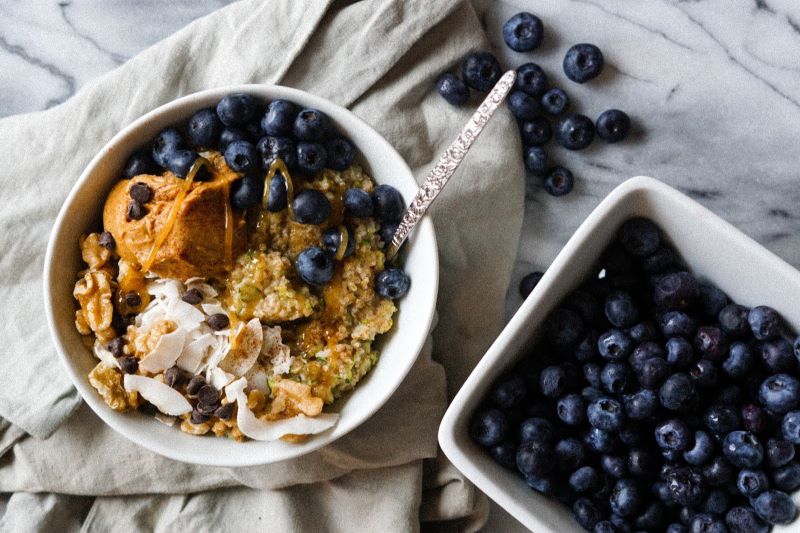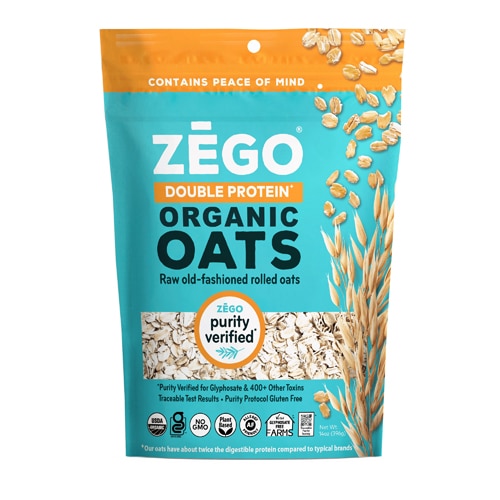Zego Gluten Free Organic Old Fashioned Rolled Oats Description
- Double The Digestible Protein + 20% To 40% More Fiber and Iron Than Typical Oatmeal
- Purity Verified For 500+ Pesticides, Heavy Metals, Mycotoxins with Traceability to Each Bag
- 100% Purity Protocol Gluten Free (<5PPM)
- Glyphosate Free, Top 14 Allergen Free
- Active Enzymes Prevent Antinutrient Overgrowth, Giving You Superior Digestibility.
- Better Oatmeal Choice for Those with Diabetes Due to High Fiber Lower Glycemic Load.
- Perfect for Baby’s First Food, Highly Nutritious and With Proven Purity.
- Raw - See Special Preparation Directions
Zego uses a hull-free, specialty seed that is higher in nutrients than other varieties of oats. The oats are 100% raw, rolled out using a unique cold, waterless process, which preserves nutrients and prevents mycotoxins. As a result, you get about double the digestible protein, 20-40% more fiber and iron, and superior digestibility compared to typical heat-processed oatmeal. Best of all, you get rich, robust flavor.
Zego’s Double Protein Oats are grown in the U.S. Mountain Region on small farms and 3rd party tested for over 500 pesticides including glyphosate and paraquat, heavy metals, allergens, and other toxins. Each bag’s QR code will trace you to its purity test results, which are also on Zego’s website.
Double Protein Oats are 100% purity protocol gluten-free (the highest GF standard) and processed in a top 14 allergy free facility.
Raw oats must be prepared in a specific way due to their active enzymes or some people may detect bitter notes. Please follow the preparation instructions below. If you are extremely sensitive to bitterness, try our organic muesli, which uses a different oat variety.
Directions
Stovetop (recommended): Boil 2 parts water with a pinch of salt. Stir in 1 part oatmeal and simmer for 10 minutes.
Microwave (not recommended unless following these instructions): Using a fglass container with twice the volume of your water, boil 2 parts water with a pinch of salt. Stir in 1 part oatmeal and microwave on low for approximately 1.5 minutes. Watch to make sure it doesn’t overflow. Stir and let rest for another 3 minutes to finish cooking and cool before handling.
Creamy Oat Milk: Put 1 cup of oats + pinch of salt in a glass blender and cover with boiling water (we like adding 1t vanilla +2 dates). Let sit for 10 minutes. Then add 2 cups of cold water. Blend on high for 1-2 minutes. Let the oat “meal” settle for a few minutes and pour off or strain the milk into a glass storage jar. Tip: Use the remaining oat “meal” as breakfast porridge or baby food.
Baby Food: Follow oat milk instructions without adding in additional cold water. Or, grind 1 part dry oatmeal in blender and cook stovetop with twice the volume of boiling water + pinch of salt. Simmer 5-10 minutes.
Overnight Oats: If you are not cooking raw oats, you Must add salt, an acid like lemon juice or yogurt to stop the enzyme activity. Otherwise, the oats will develop into a sourdough starter and have an off taste.
Sourdough Starter, Savory Oats, Delicious Baked Goods: See Zego’s website magazine for more great recipes.
Free Of
Gluten, glyphosates, pesticides, heavy metals, top 14 allergens.
*These statements have not been evaluated by the Food and Drug Administration. This product is not intended to diagnose, treat, cure, or prevent any disease.
Nutrition Facts
Serving Size: 1/2 Cup (48 g)
Servings per Container: Approx. 8
| Amount Per Serving | % Daily Value |
|
| Calories | 190 | |
|
| Total Fat | 4 g | 6% |
|
| Saturated Fat | 1 g | 5% |
|
| Trans Fat | 0 g | |
|
| Cholesterol | 0 g | 0% |
|
| Sodium | 0 g | 0% |
|
| Total Carbohydrate | 31 g | 10% |
|
| Dietary Fiber | 6 g | 25% |
|
| Total Sugars | 0 g | |
|
| Includes 0g Added Sugars | | 0% |
|
| Protein | 10 g | 20% |
|
| Vitamin D | 0 mcg | 0% |
|
| Calcium | 50 mg | 5% |
|
| Iron | 2.5 mg | 10% |
|
| Potassium | 270 mg | 5% |
|
Other Ingredients: Organic, purity protocol gluten free, raw rolled oats.
The product you receive may contain additional details or differ from what is shown on this page, or the product may have additional information revealed by partially peeling back the label. We recommend you reference the complete information included with your product before consumption and do not rely solely on the details shown on this page. For more information, please see our
full disclaimer.
Reviews
View printable version
Print Page
Zoats (Zucchini Oats)
[vc_row][vc_column][vc_column_text]Ditch the boring oats! This zucchini oats recipe is here to take your breakfast game to the next level. Loaded with protein and fiber, this creamy, veggie-powered dish packs a hidden green surprise (pssst, you can't even taste the zucchini!). Zoats are your new go-to for a satisfying, healthy breakfast that's endlessly customizable with all your favorite toppings.

Zoats (Zucchini Oats)

- 1 cup Zego Double Protein Organic Raw Old-Fashioned Rolled Oats
- 1-3/4 cups milk of choice
- 1 zucchini
- 1 tsp. ground cinnamon
- Pinch ground nutmeg
- Pinch salt
- 2 Tbsp. maple syrup (or sweetener of choice)
Optional add-ins
- Peanut butter
- Coconut flakes
- Seeds
- Nuts
- Honey
- Chocolate chips
- Using grater, shred zucchini and drain using cheesecloth or colander.
- In small saucepan over high heat, combine oats, milk, zucchini, cinnamon, nutmeg and salt and bring mixture to boil. Lower heat and simmer until oats are tender, about 5 minutes, stirring often.
- Add maple syrup to taste and any add-ins of choice. Serve warm.
Get the ingredients you’ll need to make a greened-up bowlful!

[/vc_column_text][/vc_column][/vc_row][vc_row][vc_column][vc_text_separator title="Featured Products" border_width="2"][vc_row_inner equal_height="yes" content_placement="middle" gap="35"][vc_column_inner width="1/3"][vc_single_image image="174975" img_size="full" alignment="center" onclick="custom_link" img_link_target="_blank" css=".vc_custom_1715377933190{padding-right: 7% !important;padding-left: 7% !important;}" link="https://www.vitacost.com/zego-gluten-free-organic-old-fashioned-rolled-oats"][/vc_column_inner][vc_column_inner width="1/3"][vc_single_image image="174974" img_size="full" alignment="center" onclick="custom_link" img_link_target="_blank" css=".vc_custom_1715377968328{padding-right: 7% !important;padding-left: 7% !important;}" link="https://www.vitacost.com/dream-organic-soy-milk"][/vc_column_inner][vc_column_inner width="1/3"][vc_single_image image="174973" img_size="full" alignment="center" onclick="custom_link" img_link_target="_blank" css=".vc_custom_1715377998670{padding-right: 7% !important;padding-left: 7% !important;}" link="https://www.vitacost.com/shady-maple-farms-100-pure-organic-maple-syrup-12-7-fl-oz-2"][/vc_column_inner][/vc_row_inner][/vc_column][/vc_row]






